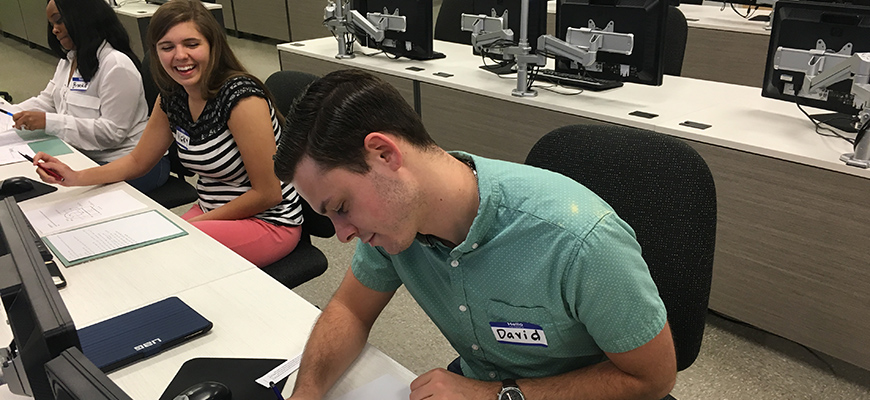
Solving the equation
Why S.C. lacks math and science teachers and how Carolina is tackling the problem
Posted on: March 9, 2018; Updated on: March 9, 2018
By Kathryn McPhail, mcphailk@mailbox.sc.edu, 803-777-8841
Education student David Rose decided to become a teacher because — like many of us — he was inspired by one of his high school teachers who taught with charisma and passion.
“My 11th-grade math teacher had a great attitude and was so motivating,” Rose says. “She helped me realize that not only did I have a love and skill for math, but also I wanted to teach.”
After some advice from his high school counselor, Rose decided to major in math at Carolina and then pursue a Master of Teaching so he could earn certification to teach high school math. The accelerated program allows students to earn a bachelor’s and a master’s degree in just five years.
Rose received the Robert Noyce Scholarship for Secondary Science and Mathematics Education which awards up to $11,500 a year for juniors and seniors who want to teach science or math. The program, a collaboration between the College of Education and the College of Arts and Sciences, is funded through a $1.4-million grant from the National Science Foundation and allows academically qualified students to complete a bachelor's degree in math, science or engineering and a one-year Master of Teaching certification program.
If this scholarship can help ease the burden of paying for certification, hopefully we can convince more qualified math and science majors that teaching is a wonderful career path.
Christine Lotter, education professor
“Our goal through this scholarship program is to lessen South Carolina’s teacher shortage in these critical STEM areas,” said Christine Lotter, education professor. “We have already funded 67 future science and math teachers with help from the previous grant, and we will graduate another 31 students with our current five-year grant. The impact is clear.”
Though the University of South Carolina is graduating an increasing number of science and math educators, the state — and nation — is still in desperate need of these teachers. Statistics from the U.S. Department of Education show 48 out of 50 states do not have enough math teachers to fill the shortage. And, 43 out of 50 states are experiencing science teacher shortages.
Lotter believes the main factors that deter students from becoming math and science teachers are low pay — especially compared with private-sector jobs — and misconceptions about STEM fields.
“Students who major in STEM areas typically make more money working directly in those fields rather than teaching those subjects. Also, the way many students are taught STEM in K-12 schools discourages them from pursuing STEM careers,” Lotter says. “They are taught that science and math careers are only for very smart people or that science and math are just a bunch of facts to be memorized. Instead, students need to learn that science and math are related to their everyday life and these skills can be used to solve many issues facing the world today.”
Lotter hopes the scholarship encourages students to push past those misconceptions and consider teaching.
“If this scholarship can help ease the burden of paying for certification, hopefully we can convince more qualified math and science majors that teaching is a wonderful career path. And through the many excellent training opportunities in our program, I hope that our scholars can learn to teach math and science in innovative ways that will, in turn, encourage more high school students to pursue STEM careers.”
Since the scholarship requires recipients teach high school science or mathematics in a high-need school for two years for each year the scholarship is received, the program is also tackling the state’s teacher shortage.
“I am most excited about having my own classroom and being able to craft my lessons,” says Rose, who recently accepted a job teaching math next year at Dreher High School in Columbia. “As part of my practicum work, I’m spending six weeks this semester teaching at another high school in town. I feel well prepared to take on the profession because of this master’s program. As a teacher, no day is like the last. It’s a unique profession that allows you to do what you love while serving others.”
Learn more
Find out more about the Robert Noyce Scholarship for Secondary Science and Mathematics Education or email Christine Lotter at lotter@mailbox.sc.edu for more information. Applications for the scholarship are due April 6.